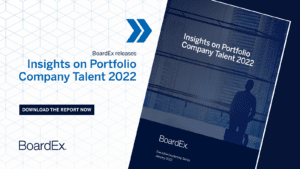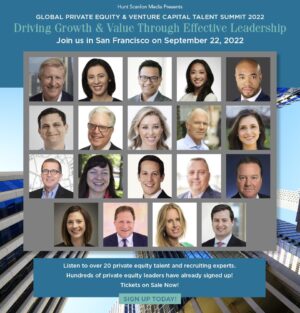Private Equity Recruiting Takes Off in Hot Market for Talent

January 6, 2022 – Private equity firms have been pulling strongly in a direction all their own, not only bucking the challenges impacting other businesses but clearly passing key inflection points for growth. According to Dominic Lévesque, president of Tatum: “We’re seeing huge reserves of dry powder on tap, and along with it, sky-high valuations. Small wonder, then, that the ‘2021 Private Equity Outlook’ from Pitchbook teems with hints of broken records.”
Mr. Lévesque says to consider forecasts like the following, for instance: PE fundraising is on track to surpass $330 billion in 2021, an all-time high; overall deal value for carveouts this year could reach the highest levels ever recorded; at least 20 PE-backed companies are expected to enter public markets in the U.S. by way of reverse mergers with special purpose acquisition companies. So, it is no wonder that private equity firms today are paying more attention than ever to having the right people in senior roles at their portfolio companies and developing their executive leadership teams to drive growth.
Talent and culture are the key areas that Bain Capital Private Equity focuses on when considering potential acquisitions. But that is just the beginning of what Susan Levine, a managing director and head of talent for the firm, describes as a journey to building strong portfolio companies. Truth be told, ahead lie many months of assessment, development, and for leaders and their teams, self-discovery.
“We need to ensure that once we figure out what companies to buy we really spend a lot of time to trying to make sure that we have the right CEOs and C-level leaders,” Ms. Levine said. “And furthermore, making sure the team – not just the CEO, but the whole executive leadership team (ELT) – is working together in a strong and high performing way.”
The results, she says, are obvious. “When you see that happening it is pretty extraordinary,” said Ms. Levine. “You see the teams working and gelling together more quickly. In those investments where that has happened, we have definitely seen greater returns. It sounds like motherhood and apple pie, but it takes a lot of work to get there. Our main focus once we buy the companies, even starting in the investment period, is ‘What is the kind of person who is going to be able to lead this investment and what does the team need to do?’ There is a very close connection between talent and maximizing talent so we can achieve greater equity value returns.”
“Competitive” is how Alison Woodhead, senior partner at Kingsley Gate Partners, described the executive search market for PE talent. “It is a very hot market for talent right now,” she said. “Across industries, functions and disciplines, strong executives are bombarded with recruiter calls. Candidates who are open to exploring new opportunities are often presented with multiple offers. Momentum and speed of decision making are crucial for attracting the best talent.”
“With an even higher emphasis on EBITDA growth to justify these history-defining multiples, PE firms have had to be even more selective, hands-on and engaged with the executives driving value creation in this environment,” she said.
The most direct way a search partner can help PE/VC firms looking to build out management teams is obviously to identify, attract and introduce strong talent, according to Ms. Woodhead. “However, the true value of a strong search partner lies a level deeper—in the unique perspective and pattern recognition that comes from speaking with the most successful and influential players in a given space,” she said. “A search consultant is well positioned to help craft and execute on a talent strategy that aligns with the vision behind the investment thesis.” Sometimes a search consultant can even surface opportunistic investment and acquisition opportunities.
“As always, CEOs and CFOs are in high demand, but now more than ever,” Ms. Woodhead said. “Private equity environments demand executives who are data oriented, comfortable with ambiguity and have a bias toward action. The ideal candidate has these characteristics accompanied by prior experience in a PE-backed environment, with at least one successful liquidity event under their belt.”
CFOs In Demand
For many PE firms, the CFO is their most common change-out role either post-recovery after COVID and/or during an acquisition or post-acquisition, according to Bernard Layton, managing director and CEO of Comhar Partners. “We are experiencing critical shortages of capabilities of CFOs that have both domain experience around the particular private equity portfolio companies’ business line and having had prior private equity successful experience,” he said.
 Over Two-Thirds of Current U.S. Portfolio Company CEOs and CFOs Were Appointed Externally
Over Two-Thirds of Current U.S. Portfolio Company CEOs and CFOs Were Appointed Externally
BoardEx’s Insights on Portfolio Company Talent 2022 offers unique insight into the characteristics of the CEOs and CFOs who lead these companies, making it an essential read for firms looking to make the most of their talent management and acquisition strategies.
Leadership teams play a critical role in their portfolio companies and the impact on company performance. The CEOs and CFOs brought in to steer these companies are selected for their experience and connections aiding the PE firm in recruitment, due diligence efforts and facilitating business development. To view the full report click here!
Mr. Layton thinks there is generally a little deeper dive in due diligence that has been going on since 2020. “Certain private equity firms focus in distressed environments and I think they are thriving and doing extraordinarily well,” he said.
Related: The Rise of the Private Equity Chief Talent Officer
“I think frankly that the issue is executive search firms need to fully understand the mindset of the private equity organizations that they’re working with,” Mr. Layton said. “There is just an inherent compatibility almost as if a dear friendship dynamic exists between consultants in the executive search world and their corresponding relationships with PE firms. There is an affinity there and if that affinity is working and there has been a successful track record with them, it’s very, very hard to see them deviate away.”
Challenging Market
“The current climate for recruiting executives in the private equity sector is incredibly challenging and I do not see this letting up any time soon,” said Matthew Shore, president of StevenDouglas. “Given the incredible bounce back in the economy, the explosion of new PE firms over the last five to 10 years, historic low interest rates and over a trillion dollars of dry powder to be deployed, finding proven PE leadership will be challenging for some time.”
“I was recently at a conference with 75 PE firms in attendance and the biggest issue they are all have is finding great talent for their portfolio companies, particularly in the CFO, COO, CTO and CHRO roles,” he said. The consensus, he said, was that executive search mandates are taking longer than expected, compensation levels are going up, candidates are leveraging multiple offers and compelling counteroffers have become commonplace. “It seems that these days, a search is not truly complete until the executive shows up for the first day on the job.”
Related: 3 Qualities Private Equity Firms Seek When Picking Portfolio CEOs
That said, many executive search firms are having record years due to the unprecedented demand for talent created by the pandemic and the dramatic expansion that is now taking place. “Now more than ever, PE/VC firms are having to develop strong relationships with executive search firms,” he said.
 Strong Resurgence in Search Activity in the Private Equity Sector
Strong Resurgence in Search Activity in the Private Equity Sector
The current state of recruiting within the PE sector remains strong. “The search firms that recruit in certain sectors that PE firms invest in are doing very well,” said Tim Russell, managing partner of The Tolan Group. “GPs are shifting their focus back to growth and scale in preparation for exit, as opposed to crisis management focusing on liquidity and cash flow concerns and strategy adjustment, which is what most of the focus was on in 2020.” Hiring across the sector started to heat up in October of last year,” Mr. Russell said. “The pace picked up considerably as 2021 rolled on and a familiar velocity of deal activity resumed.”
“Having been in executive search for 25 years, the current market is the frothiest we have ever seen in private equity, particularly for CFOs and other critical C-suite roles,” said Kevin Hahn, CEO of Spectrum Search Partners. “COVID has transformed some leaders who were otherwise solid B players into C and D players with added complexities within their markets, cash flow constraints, supply-chain disruptions and other curveballs not ordinarily seen in most normal times,” he said.
As a result, many PE firms have been focused on replacing those leaders with more nimble and agile executives who can thrive under these pressures. Most of the candidates Mr. Hahn’s search firm speaks with, he said, are receiving several inquiries a week, which has made it difficult for some companies to stand out and cut through the clutter. Creating a compelling value proposition has never been more important.
Changing Market Demands
“It’s a hyper-competitive landscape for the PE sector,” said Maximillian Stubenvoll, principal, consumer and industrial practices for Acertitude. “Great leaders have multiple opportunities, especially those with a track record of successful business transformations and exits. Compensation is also inflating as a result, at rates that could be 20 percent or more than prior years,” he noted.
“The pandemic is fundamentally different to the last significant market shift we saw in the 2008 global financial crisis,” said Charlotte Cederwall, partner, consumer practice at Acertitude. “To bounce back from that, critical change was required at an institutional, government and country level. This time around, no underlying flaws were creating a market slowdown that would take time to recover, so as soon as life started returning to normal, pent-up demand was released, resulting in the boom seen now in certain markets.”
Related: Larger Funds Bring Increased Competition for Private Equity Talent
Contributed by Scott A. Scanlon, Editor-in-Chief; Dale M. Zupsansky, Managing Editor; and Stephen Sawicki, Managing Editor – Hunt Scanlon Media












